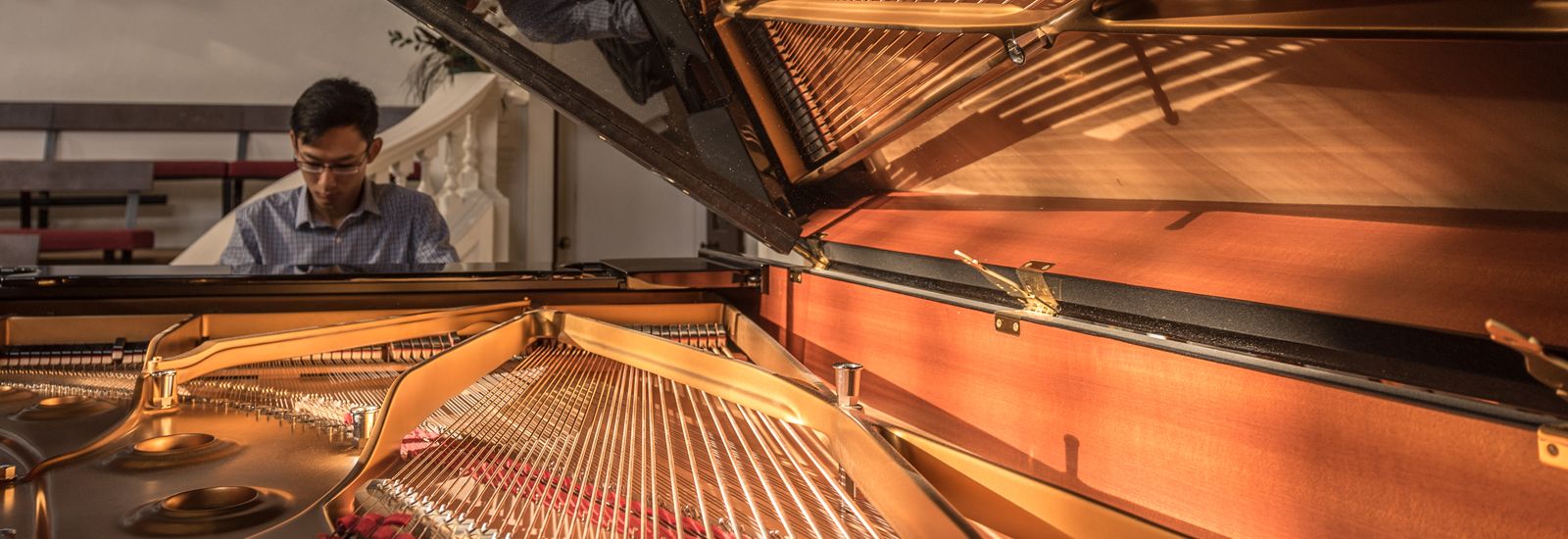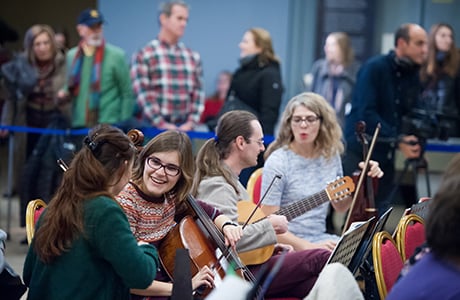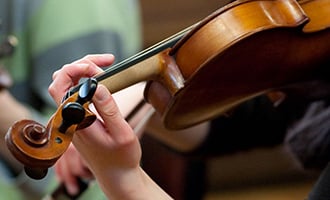
Music
Course overview
UCAS code: W300
Entrance requirements: AAA
Course duration: 3 years (BA)
Subject requirements
Required subjects: Music A-level (or equivalent) or Music Theory Grade 7 or above (see admissions requirements tab).
Recommended subjects: Not applicable
Helpful subjects: Not applicable
Other course requirements
Admissions tests: Performance performance video
Written Work: Three pieces (two essays and one piece of harmony or counterpoint)
Admissions statistics*
Interviewed: 93%
Successful: 41%
Intake: 76
*3-year average 2022-24
Contact
Tel: +44 (0) 1865 286264
Email: academic.admin@music.ox.ac.uk
Unistats information for this course can be found at the bottom of the page
Please note that there may be no data available if the number of course participants is very small.
About the course
Music is everywhere in the world around us; it is part of all of our lives, whether we play it, actively listen to it, or hear it in passing.
At Oxford, we study music by reading, listening, performing and composing. We create music in all its aspects – acoustic, electronic, individually and communally, working with world-class professionals and with local communities. We analyse the relationships within a piece of music, and between that piece and its genre and context.
Throughout the course, you will be exposed to music of all kinds and in all contexts:
- Western classical
- popular music
- global, world and traditional musics
- community music
- seeing these musics in terms of their social and cultural contexts (and how those contexts have been shaped over time).
Music has been part of the life of Oxford for more than 800 years. There are around 30 academic staff, of whom 15 give lectures regularly – scholars with distinguished reputations as musicologists, performers and composers. Oxford welcomes visits from numerous speakers and professional performing ensembles.
From October 2025, the Faculty of Music will be located at the The Stephen A. Schwarzman Centre for the Humanities. This new state-of-the-art building includes a concert hall, lecture spaces, film screening theatre, black box experimental performance space, practice rooms and a multimedia digital TV broadcasting and sound studio. The world-famous Bate Collection of Musical Instruments, which lends historical instruments to students will also be moving to the new centre.
The course is broadly based but allows increasing specialisation and choice as you proceed. Whether you’re a performer, a composer, a budding scholar of music history, sociology, psychology or education, the Music course offers something for you.
Students graduate as mature and well-rounded musicians with an informed and lively sense of the contemporary study and practice of the subject, and the ways in which music contributes to society more broadly.
 |  | |
'The Oxford music course suits me because it is broad and varied, but also has lots of space to make it my own. For my final exams I am sitting papers in broad aspects of music history (from English renaissance polyphony to electronic music), analysis, and issues to do with how we study music but I am also writing a dissertation about the music in a primary school near Oxford, essays on Brazilian music, and a report from the term I spent working on a music project with children with autism. I have friends who are playing the Rite of Spring for piano duet for a chamber music exam, who are singing Schubert Lieder for a solo recital, and who are analysing Bach organ fugues for an analysis portfolio – and those are just the people in my year in my college!' Sarah | 'From playing for three evensongs a week to being immersed in the sound world of the Bosavi Rainforest people in Papua New Guinea, Oxford has been a fantastic experience so far. One aspect of Oxford’s music course that first attracted me was the diversity and the choice it gives students, particularly in the final year. I am currently studying a variety of history topics, ranging from the 13th-century motet to film music, along with some composition and analysis courses. I want to be a performer and knowing that I can choose to concentrate on this later in the course has helped me to focus my interests throughout the term.' Olivia |
Unistats information
Discover Uni course data provides applicants with Unistats statistics about undergraduate life at Oxford for a particular undergraduate course.
Please select 'see course data' to view the full Unistats data for Music.
Please note that there may be no data available if the number of course participants is very small.
Visit the Studying at Oxford section of this page for a more general insight into what studying here is likely to be like.
Music
A typical week
- Four to six lectures
- One or two tutorials in college
- Practice, workshops and rehearsals
- More time for independent study in the summer terms
Tutorials are usually 2-4 students and a tutor. Lecture sizes may vary depending on the options you choose. Compulsory lectures are the largest and will include the full year group of around 70 students, while the smallest lectures, for specialist options, might include fewer than 10 students. Seminars will also usually involve 10-12 students.
Most lectures are delivered by Associate Professors and Professors within the University. Most of these professors are also college subject tutors (although not all college tutors are University lecturers). Each college’s subject tutor is responsible for giving and coordinating tutorials.
Many tutors are world-leading experts with years of experience in teaching and research. Some teaching (mostly at tutorial level) may also be delivered by postgraduate students, who are usually studying at doctoral level.
To find out more about how our teaching year is structured, visit our Academic Year page.
Course structure
Year 1
Courses | Assessment |
|---|---|
Six subjects are taken (two chosen from a list of options)
| Three written papers and two ‘take-away’ papers for compulsory subjects. The assessment for the two options will take the form of a written paper, practical examination, recital, portfolio of compositions, essay or take-away paper depending on the option chosen. |
Year 2
Courses | Assessment |
|---|---|
Students are given the option to take seven papers:
Please note that the courses listed in this section are illustrative and may change. Copies of our current student handbooks, with details of all courses are available on the Music website. | Final University examinations: two written examinations (with more possible, depending on student options) and a combination of take-away papers, portfolio submissions, recitals and practical tests, depending on the options chosen |
The content and format of this course may change in some circumstances. Read further information about potential course changes.
Academic requirements
Qualification | Requirements |
|---|---|
A-levels: | AAA |
Advanced Highers: | AA/AAB |
International Baccalaureate (IB): | 38 (including core points) with 666 at HL |
Any other equivalent qualification: | View information on other UK qualifications, and international qualifications. |
Wherever possible, your grades are considered in the context in which they have been achieved.
Read further information on how we use contextual data.
Subject requirements
Essential: | Candidates are expected to have Music to A-level, Advanced Higher, Higher Level in the IB (or equivalent) or Music Theory Grade 7 or above* |
|---|
* If your school or college does not offer A-level Music, you must have Music Theory Grade 7 or above, plus three A-levels. We accept Grade 7 from any board (e.g. ABRSM, Trinity).
The Faculty accepts BTEC Music in place of Music A-level, where a student is not able to take Music A-level at their school. BTECs in other subjects may be accepted, depending on the subject taken and at the discretion of the individual admitting tutor and their college. The Faculty of Music will consider other vocational qualifications in Music; however, an accompanying A-Level in an essay subject, or a strong grade in an Extended Project Qualification (EPQ), is strongly recommended.
The Faculty does not require qualifications in performance or Keyboard Skills, and no candidate should be dissuaded from applying if they have not studied a keyboard instrument or performed to a high level. However, we encourage students to work on developing their keyboard fluency before they come to Oxford, whether this comes in the form of jazz, pop or classical music.
We find it can make a helpful contribution to work on the first year SCART and Musical Skills papers, and it helps consolidate students’ general musicianship, too.
If you are unsure about your qualifications please contact academic.admin@music.ox.ac.uk.
If a practical component forms part of any of your science A‐levels used to meet your offer, we expect you to pass it.
If English is not your first language you may also need to meet our English language requirements.
Applying
All candidates must follow the application procedure as shown on our Applying to Oxford pages.
The following information gives specific details for students applying for this course.
Admissions tests
There is no written test but candidates are required to submit a video recording of up to 5 minutes performing on their chosen instrument or voice in advance of their interview. Candidates should not be concerned with the quality of recording space or equipment as this will not be taken into account.
Many tutors will ask you to study a short piece of music and/or text about music in preparation for your interview; if so, this material will be given to you shortly in advance but typically on the same day as your interview.
Written work
Description: |
Candidates are required to submit a video recording of up to 5 minutes performing on their chosen instrument or voice in advance of their interview. |
|---|---|
Submission deadline: | 10 November 2024 |
Visit our further guidance on the submission of written work for more information, and to download a cover sheet.
What are tutors looking for?
There is no typical music student at Oxford, and students can flourish with a wide variety of strengths and interests within the broad field of music.
Tutors will be looking for potential to engage with the course, an ability to think critically about music, and a keen interest in learning more about this subject.
Visit the Music website more detail on the selection criteria for this course.
Careers
The varied nature of the course enables students to develop highly desirable skills in areas such as:
- self-management
- creativity
- data analysis
- performance
- teamwork
- problem-solving
- and communication,
All of which makes our graduates an attractive prospect for potential employers.
Teaching, performance and arts administration are among the popular destinations for Music graduates, but others include broadcasting, publishing, law, politics and the Civil Service.
Many students undertake further study in performance, often at conservatoires in the UK and abroad. An Oxford Music degree opens doors to a wide range of careers both within and outside the arts.
After graduating, Fabienne secured a marketing and public relations internship with the Philharmonia Orchestra. She then worked for the Royal Philharmonic Orchestra and London Symphony Orchestra before being headhunted for her current role as Head of Communications and Marketing at Intermusica, an industry-leading international classical music management agency. She says;
‘Our roster includes Marin Alsop, Sir John Eliot Gardiner, Daniil Trifonov, Sir Willard White, James MacMillan, Leonidas Kavakos and many others. Naturally my music degree has proved an extremely helpful foundation for a career in classical music management but I would say that the most important thing I gained from Oxford was confidence and resilience and being able to meet people from all walks of life.’
Note: These annual fees are for full-time students who begin this undergraduate course here in 2025. Course fee information for courses starting in 2026 will be updated in September.
We don't want anyone who has the academic ability to get a place to study here to be held back by their financial circumstances. To meet that aim, Oxford offers one of the most generous financial support packages available for UK students and this may be supplemented by support from your college.
Fees
Fee status | Annual Course fees |
| Home | £9,535 |
| Overseas | £46,600 |
Further details about fee status eligibility can be found on the fee status webpage.
For more information please refer to our course fees page. Fees will usually increase annually. For details, please see our guidance on likely increases to fees and charges.
Living costs
Living costs at Oxford might be less than you’d expect, as our world-class resources and college provision can help keep costs down.
Living costs for the academic year starting in 2025 are estimated to be between £1,425 and £2,035 for each month you are in Oxford. Our academic year is made up of three eight-week terms, so you would not usually need to be in Oxford for much more than six months of the year but may wish to budget over a nine-month period to ensure you also have sufficient funds during the holidays to meet essential costs. For further details please visit our living costs webpage.
Financial support
Home | A tuition fee loan is available from the UK government to cover course fees in full for Home (UK, Irish nationals and other eligible students with UK citizens' rights - see below*) students undertaking their first undergraduate degree**, so you don’t need to pay your course fees up front. In 2025 Oxford is offering one of the most generous bursary packages of any UK university to Home students with a family income of around £50,000 or less, with additional opportunities available to UK students from households with incomes of £32,500 or less. The UK government also provides living costs support to Home students from the UK and those with settled status who meet the residence requirements. *For courses starting on or after 1 August 2021, the UK government has confirmed that EU, other EEA, and Swiss Nationals will be eligible for student finance from the UK government if they have UK citizens’ rights (i.e. if they have pre-settled or settled status, or if they are an Irish citizen covered by the Common Travel Area arrangement). The support you can access from the government will depend on your residency status. |
Islands | Islands students are entitled to different support to that of students from the rest of the UK. Please refer the links below for information on the support to you available from your funding agency: |
Overseas | Please refer to the "Other Scholarships" section of our Oxford Bursaries and Scholarships page. |
**If you have studied at undergraduate level before and completed your course, you will be classed as an Equivalent or Lower Qualification student (ELQ) and won’t be eligible to receive government or Oxford funding
Additional Fees and Charges Information for Music
Students may choose to have instrumental or voice tuition as part of their course, though please note that performance is not compulsory. With advice from your tutors, you can choose your own instrumental tutors. You will need to pay for these lessons yourself, but the money will be refunded by the Music Faculty at the end of term, up to £275. This usually covers the full cost of tuition.
Students can also apply to take part in a Faculty-funded scheme with the Royal Academy of Music (RAM), which provides 8 hourly lessons and participation in master-classes and performance classes at the RAM.
Contextual information
Unistats course data from Discover Uni provides applicants with statistics about a particular undergraduate course at Oxford. For a more holistic insight into what studying here is likely to be like, please view the information below and explore our website more widely.
The Oxford tutorial
College tutorials are central to teaching at Oxford. Typically, they take place in your college and are led by your academic tutor(s) who teach as well as do their own research. Students will also receive teaching in a variety of other ways, depending on the course. This will include lectures and classes, and may include laboratory work and fieldwork. However, tutorials offer a level of personalised attention from academic experts unavailable at most universities.
During tutorials (normally lasting an hour), college subject tutors will give you and one or two tutorial partners feedback on prepared work and cover a topic in depth. The other student(s) in your tutorials will typically be doing the same course as you and covering the same topic. Such regular and rigorous academic discussion develops and facilitates learning in a way that isn’t possible through lectures alone. Tutorials also allow for close progress monitoring so tutors can quickly provide additional support if necessary.
Read more about tutorials and an Oxford education
College life
Our colleges are at the heart of Oxford’s reputation as one of the best universities in the world.
- At Oxford, everyone is a member of a college as well as their subject department(s) and the University. Students therefore have both the benefits of belonging to a large, renowned institution and to a small and friendly academic community. Each college or hall is made up of academic and support staff, and students. Colleges provide a safe, supportive environment leaving you free to focus on your studies, enjoy time with friends and make the most of the huge variety of opportunities.
- Each college has a unique character, but generally their facilities are similar. Each one, large or small, will have the following essential facilities:
- Porters’ lodge (a staffed entrance and reception)
- Dining hall
- Lending library (often open 24/7 in term time)
- Student accommodation
- Tutors’ teaching rooms
- Chapel and/or music rooms
- Laundry
- Green spaces
- Common room (known as the JCR).
- All first-year students are offered college accommodation either on the main site of their college or in a nearby college annexe. This means that your neighbours will also be ‘freshers’ and new to life at Oxford. This accommodation is guaranteed, so you don’t need to worry about finding somewhere to live after accepting a place here, all of this is organised for you before you arrive.
- All colleges offer at least one further year of accommodation and some offer it for the entire duration of your degree. You may choose to take up the option to live in your college for the whole of your time at Oxford, or you might decide to arrange your own accommodation after your first year – perhaps because you want to live with friends from other colleges.
- While college academic tutors primarily support your academic development, you can also ask their advice on other things. Lots of other college staff including welfare officers help students settle in and are available to offer guidance on practical or health matters. Current students also actively support students in earlier years, sometimes as part of a college ‘family’ or as peer supporters trained by the University’s Counselling Service.
FIND OUT MORE

Our 2025 undergraduate Open Days will be held on 2 and 3 July and 19 September.
Register to find out more about our upcoming Open Days.
RELATED PAGES
Feel Inspired?
Why not have a look at the faculty's recommended reading list for prospective students.
